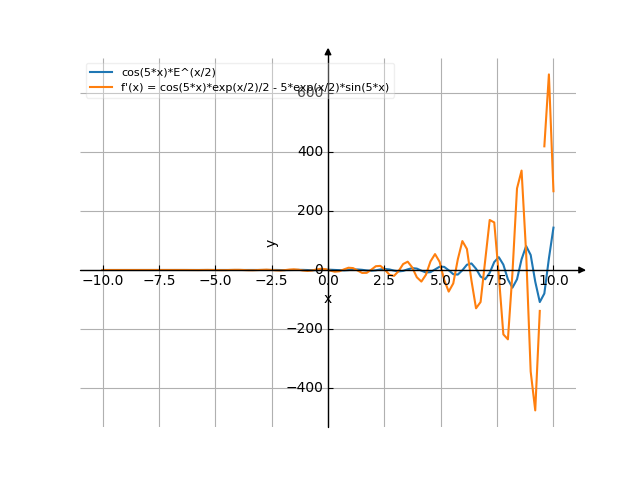Derivative of cos(5x)*e^(x/2)
The solution
You have entered
[src]
x
-
2
cos(5*x)*e
$$e^{\frac{x}{2}} \cos{\left(5 x \right)}$$
/ x\ | -| d | 2| --\cos(5*x)*e / dx
$$\frac{d}{d x} e^{\frac{x}{2}} \cos{\left(5 x \right)}$$
Detail solution
-
Apply the product rule:
; to find :
-
Let .
-
The derivative of cosine is negative sine:
-
-
Then, apply the chain rule. Multiply by :
-
The derivative of a constant times a function is the constant times the derivative of the function.
-
Apply the power rule: goes to
So, the result is:
-
The result of the chain rule is:
-
; to find :
-
Let .
-
The derivative of is itself.
-
Then, apply the chain rule. Multiply by :
-
The derivative of a constant times a function is the constant times the derivative of the function.
-
Apply the power rule: goes to
So, the result is:
-
The result of the chain rule is:
-
The result is:
Now simplify:
The answer is:
The first derivative
[src]
x
- x
2 -
cos(5*x)*e 2
----------- - 5*e *sin(5*x)
2
$$- 5 e^{\frac{x}{2}} \sin{\left(5 x \right)} + \frac{e^{\frac{x}{2}} \cos{\left(5 x \right)}}{2}$$
The second derivative
[src]
x
-
/ 99*cos(5*x)\ 2
|-5*sin(5*x) - -----------|*e
\ 4 /
$$\left(- 5 \sin{\left(5 x \right)} - \frac{99 \cos{\left(5 x \right)}}{4}\right) e^{\frac{x}{2}}$$
The third derivative
[src]
x
-
2
(-299*cos(5*x) + 970*sin(5*x))*e
---------------------------------
8
$$\frac{\left(970 \sin{\left(5 x \right)} - 299 \cos{\left(5 x \right)}\right) e^{\frac{x}{2}}}{8}$$
The graph


![Find the derivative of y' = f'(x) = cos(5x)*e^(x/2) (co sinus of e of (5x) multiply by e to the power of (x divide by 2)) - functions. Find the derivative of the function at the point. [THERE'S THE ANSWER!] cos(5x)*e^(x/2)](/media/krcore-image-pods/176/hash/derivative/0/0a/47cc99abe3414170eb3e50dc6ad52.png)
 Derivative of sqrt(x^2-1)
Derivative of sqrt(x^2-1)
 Derivative of 7x
Derivative of 7x
 Derivative of 4/x^3
Derivative of 4/x^3
 Derivative of 3x+2
Derivative of 3x+2